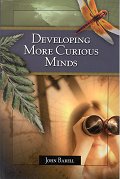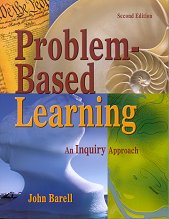A teacher turned educational consultant for the American Museum of Natural History, Barell believes many students have become too passive in their learning, accepting information and “facts” as presented in textbooks, classes, and the media. Students need many opportunities to question, think, investigate, and draw their own conclusions from the world around them. They need to treat their life as a never-ending expedition, where they and their teachers are both the explorers and guides.
Drawing on anecdotes from educators and his own life, Barell describes practical strategies to spur students’ ability and willingness to pose and answer their own questions. Antarctica expeditions, outer space discoveries, dinosaur fossils, literature, and more help define the importance of developing an inquisitive mind, using such practices as
• Maintaining journals on field trips,
• Using questioning frames and models when reading texts,
• Engaging in critical thinking and problem-based learning, and
•Integrating inquiry into curriculum development and the classroom culture.
To become habits of mind, students’ daily curiosities must be nurtured and supported. Barell draws a vivid map to guide readers to what he calls “an intelligent revolution” in which schools can become communities of inquiry—places where educators and students imagine and work together to become active citizens in their society and shape their own future.
Barell wants to make learning more active, more student-directed, more critical. Rote learning is not only a boring way to learn, it doesn’t prepare students for the more complex, open questions they will encounter outside school. Both problems can be solved by a different teaching (or rather, learning) approach: inquiry based learning. With lots of references to educational literature, and a series of real-world case studies, he shows how this can work, here for school children (primary and secondary education). I read it for its potential uses in tertiary education.
Inquiry based learning requires the student to ask good questions, and to do the work they need in order to answer them. The more authoritarian sector of society will be dismayed by this: once you have learned to ask good questions, you do it all the time, not just in controlled classroom conditions; and you continue asking questions of the answers you find out (goodbye, proof by authority). For those wanting a more informed and self-motivated citizenry, one not swayed by simplistic pronouncements of various authorities (including teachers!), this can only be good news.
Once you have got students asking good questions, and puzzling out answers, they also have to be able to determine if they have found equally good answers. There needs to be critique, of assumptions, of information (particularly that gained from the Web), of evidence, of reasoning. Barell, however, focusses more on the process of getting students to ask good questions rather than on how they then find good answers. (It is a pre-requisite, of course.) What he says about critique along these lines concentrates more on the effectiveness of the process rather than the quality of the result:
1. Planning. What’s the problem and how will I go about solving it?
2. Monitoring: How well am I doing in working toward my goal?
3. Evaluating: How well did I do? What would I do differently next time? Why?
Both process and result are important. For education, as described here, critiquing the process is key: you want to be able to continually improve how you ask and answer questions. In education, the actual answer to the question is secondary: although the answers are interesting, and you can build on this knowledge later, the specific problems are vehicles for learning how to learn, learning how to tackle novel questions that require previously unknown information to answer. But for real-world situations, critiquing your answer is key: you want to be able to depend on it. So education needs to cover critiquing, too.
I suspect that the focus here is on good questions more than good answers, partly due to needing to provide quite a bit of material on just getting the students engaged and asking the questions, and partly due to the focus on school children. But from the little I have seen of this process in practice, the focus in inquiry based learning sessions is on getting the answers, rather than on learning how to get the answers (this happens by osmosis), and certainly not on learning how to get better at getting the answers, which (except for the exceptional students who can work it out for themselves) requires some explicit focus on meta-cognitive skills.
One very important point Barell makes is that a learning session should not just end with satisfaction in the found answer, but should continue: “what new questions do we have now?” Any truly interesting problem raises more questions the more you find out about it. This is a feature of the openness of reality, as opposed to the closedness of many artificial problems traditionally presented to students.
Barell also points out a deep problem: most scientists, in particular, will agree that the most important quality of a good scientist is the ability to ask good questions. Yet the relevant curriculum rarely teaches how to ask good questions, and never assesses this ability. This is a clear indication of a problem!
So there is a lot of interesting and thought provoking material here. But I think there could be a better linking between the educational literature suggestions, and the case study material. The major downside of the book is the heavy-handed assumption that the reader is American, and particularly an American traumatised by the recent 9/11 atrocity. I think the rationale for the advocated approach is much more widely applicable, and much more widely needed: this educational approach would help make the world a better place.

